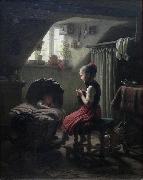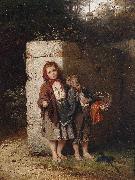Johann Georg Meyer Huiler la Reproduction de TableauAll Johann Georg Meyer Oil PaintingsJohann Georg Meyer (28 October 1813 Bremen, Germany - 4 December 1886 Berlin), commonly known as Meyer von Bremen, was a German painter who specialized in Biblical, peasant, and family scenes. In his 2lst year, he went to Desseldorf and began his studies at the Academy of Art there, which was led by Friedrich Wilhelm Schadow, the son of sculptor Johann Gottfried Schadow. In 1841, Meyer opened a studio of his own, but moved to Berlin as his fame increased (1853). While scenes from the Bible were first the subjects of his brush, he later turned his attention to incidents from popular life, especially among the Hessian peasantry, and finally to the portrayal of family life in its pathetic aspect. Such pictures as eThe Jubilee of a Hessian Pastore (1843), hristmas Eve,e eBlindman's Buff,e eThe Soldier's Return,e eThe Inundatione (1846), eThe Repentant Daughtere (1852, in the gallery at Bremen), are full of intense sympathy with the esimple annals of the poor.e After taking up his residence at Berlin, he chose especially scenes from child life, which he rendered with spirited humor. Among his pictures of this kind are eThe Fairy Tale,ehildren Playing Blindman's Buff,e eGrandfather and Grandchild,e and others. A third group of his pictures includes those of young women, as single figures or in groups, such as eThe Tryste and eThe Love Letter.e An example of his work, eThe Lettere (1873), is in the Metropolitan Museum of Art in New York City. |
|||

|
|||
|
|
|||
|
||||||||||||
| Johann Georg Meyer Johann Georg Meyer (28 October 1813 Bremen, Germany - 4 December 1886 Berlin), commonly known as Meyer von Bremen, was a German painter who specialized in Biblical, peasant, and family scenes. In his 2lst year, he went to Desseldorf and began his studies at the Academy of Art there, which was led by Friedrich Wilhelm Schadow, the son of sculptor Johann Gottfried Schadow. In 1841, Meyer opened a studio of his own, but moved to Berlin as his fame increased (1853). While scenes from the Bible were first the subjects of his brush, he later turned his attention to incidents from popular life, especially among the Hessian peasantry, and finally to the portrayal of family life in its pathetic aspect. Such pictures as eThe Jubilee of a Hessian Pastore (1843), hristmas Eve,e eBlindman's Buff,e eThe Soldier's Return,e eThe Inundatione (1846), eThe Repentant Daughtere (1852, in the gallery at Bremen), are full of intense sympathy with the esimple annals of the poor.e After taking up his residence at Berlin, he chose especially scenes from child life, which he rendered with spirited humor. Among his pictures of this kind are eThe Fairy Tale,ehildren Playing Blindman's Buff,e eGrandfather and Grandchild,e and others. A third group of his pictures includes those of young women, as single figures or in groups, such as eThe Tryste and eThe Love Letter.e An example of his work, eThe Lettere (1873), is in the Metropolitan Museum of Art in New York City. |
||||||||||||
|
|
||||||||||||
| ID de tableau:: 90518 Little Housewife Little Housewife 1854(1854) Medium oil on canvas Dimensions Height: 48 cm (18.9 in). Width: 36 cm (14.2 in). cyf 1854(1854) Medium oil on canvas Dimensions Height: 48 cm (18.9 in). Width: 36 cm (14.2 in). cyf |
||||||||||||
|
|
||||||||||||
| ID de tableau:: 97634 Bettelnde Kinder Bettelnde Kinder 1880(1880) Medium oil on canvas cyf 1880(1880) Medium oil on canvas cyf |
||||||||||||
|
|
||||||||||||
|
| Artiste précédent Artiste prochain | |||||||||||
|
|
||||||||||||
|
Johann Georg Meyer Johann Georg Meyer (28 October 1813 Bremen, Germany - 4 December 1886 Berlin), commonly known as Meyer von Bremen, was a German painter who specialized in Biblical, peasant, and family scenes. In his 2lst year, he went to Desseldorf and began his studies at the Academy of Art there, which was led by Friedrich Wilhelm Schadow, the son of sculptor Johann Gottfried Schadow. In 1841, Meyer opened a studio of his own, but moved to Berlin as his fame increased (1853). While scenes from the Bible were first the subjects of his brush, he later turned his attention to incidents from popular life, especially among the Hessian peasantry, and finally to the portrayal of family life in its pathetic aspect. Such pictures as eThe Jubilee of a Hessian Pastore (1843), hristmas Eve,e eBlindman's Buff,e eThe Soldier's Return,e eThe Inundatione (1846), eThe Repentant Daughtere (1852, in the gallery at Bremen), are full of intense sympathy with the esimple annals of the poor.e After taking up his residence at Berlin, he chose especially scenes from child life, which he rendered with spirited humor. Among his pictures of this kind are eThe Fairy Tale,ehildren Playing Blindman's Buff,e eGrandfather and Grandchild,e and others. A third group of his pictures includes those of young women, as single figures or in groups, such as eThe Tryste and eThe Love Letter.e An example of his work, eThe Lettere (1873), is in the Metropolitan Museum of Art in New York City. |
||||||||||||
|
|
||||||||||||
|
CONTACTER DES Etats-Unis |







